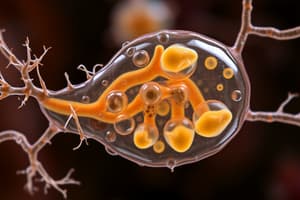Podcast
Questions and Answers
What is the primary difference between a prokaryotic cell and a eukaryotic cell?
What is the primary difference between a prokaryotic cell and a eukaryotic cell?
- The presence of a true nucleus (correct)
- The size of the cell
- The number of cells in the organism
- The ability to form tissues
What is the term for a single-celled organism that is capable of living an independent existence?
What is the term for a single-celled organism that is capable of living an independent existence?
- Prokaryote (correct)
- Microorganism
- Eukaryote
- Multicellular organism
What is the term for the membrane-enclosed nucleus found only in eukaryotes?
What is the term for the membrane-enclosed nucleus found only in eukaryotes?
- Nucleolus
- Plasma membrane
- Karya (correct)
- Cytoskeleton
What was used to determine the evolutionary relationships between living organisms in a 1977 study?
What was used to determine the evolutionary relationships between living organisms in a 1977 study?
How many distinct phylogenetic lineages were identified using rRNA sequence data?
How many distinct phylogenetic lineages were identified using rRNA sequence data?
What are the three domains of life?
What are the three domains of life?
What is the primary reason why Archaea and Bacteria were traditionally grouped together as prokaryotes?
What is the primary reason why Archaea and Bacteria were traditionally grouped together as prokaryotes?
What is the term for the study of the relationships between organisms?
What is the term for the study of the relationships between organisms?
What is the main function of the prokaryotic cell wall?
What is the main function of the prokaryotic cell wall?
Which type of bacteria has a cell wall with up to 25 layers of peptidoglycan?
Which type of bacteria has a cell wall with up to 25 layers of peptidoglycan?
What is the term for the outer layer of the Gram negative cell wall?
What is the term for the outer layer of the Gram negative cell wall?
What is the result of removing the cell wall from a prokaryotic cell?
What is the result of removing the cell wall from a prokaryotic cell?
What is the purpose of the Gram stain?
What is the purpose of the Gram stain?
What is the characteristic of bacterial cells that divide in only one plane?
What is the characteristic of bacterial cells that divide in only one plane?
What is the term for the fever-inducing component of the lipopolysaccharide layer?
What is the term for the fever-inducing component of the lipopolysaccharide layer?
What is the characteristic of eukaryotic cells?
What is the characteristic of eukaryotic cells?
What is the purpose of the cytoplasmic membrane?
What is the purpose of the cytoplasmic membrane?
What is the characteristic of the prokaryotic chromosome?
What is the characteristic of the prokaryotic chromosome?
Study Notes
Domains of Life
- The three domains of life are: Bacteria, Archaea, and Eukarya
- These domains differ significantly and are categorized based on their characteristics
Cell Structure
- Prokaryotes (Bacteria and Archaea):
- Usually small in size
- Have a cell wall that provides strength and is semi-permeable
- Have a cytoplasmic membrane that allows nutrients to enter and wastes to leave
- Have cytoplasm that contains proteins, nucleic acids, organic molecules, and ribosomes
- Have a single, usually circular chromosome that may contain extra-chromosomal DNA known as plasmids
- Eukaryotes:
- Are usually larger in size
- Typically do not have a cell wall (except for some exceptions)
- Have membrane-enclosed organelles such as a nucleus, mitochondria, and chloroplasts
Prokaryotic Cell Wall
- The main function of the cell wall is to provide integrity, rigidity, and shape to the cell
- If the cell wall is removed, the cell will lyse or burst
- The Gram stain is used to divide bacteria into two groups: Gram positive and Gram negative based on the composition of their cell walls
Gram Positive and Gram Negative Bacteria
- Gram Positive:
- Have a thick layer of peptidoglycan (PTG) in their cell wall
- PTG is arranged in parallel rows linked through glycan side chains and bridges of amino acids
- Gram Negative:
- Have a thin layer of PTG and an additional outer layer of lipopolysaccharide (LPS)
- LPS is composed of lipids and polysaccharides and is released from dead cells
- Lipid A, a component of LPS, is a pyrogen that induces fever in humans and animals
The Gram Stain
- Is a differential stain that differentiates between bacterial cell types based on their cell wall composition
- Stains Gram positive bacteria purple and Gram negative bacteria pink
- Provides information on cellular morphology and arrangement
Studying That Suits You
Use AI to generate personalized quizzes and flashcards to suit your learning preferences.
Description
This session introduces bacteria, emphasizing the prokaryotic cell and its differences from eukaryotic cells. Understand the characteristics of single-celled prokaryotes and their independent existence. Compare them to eukaryotic cells in multicellular organisms.




